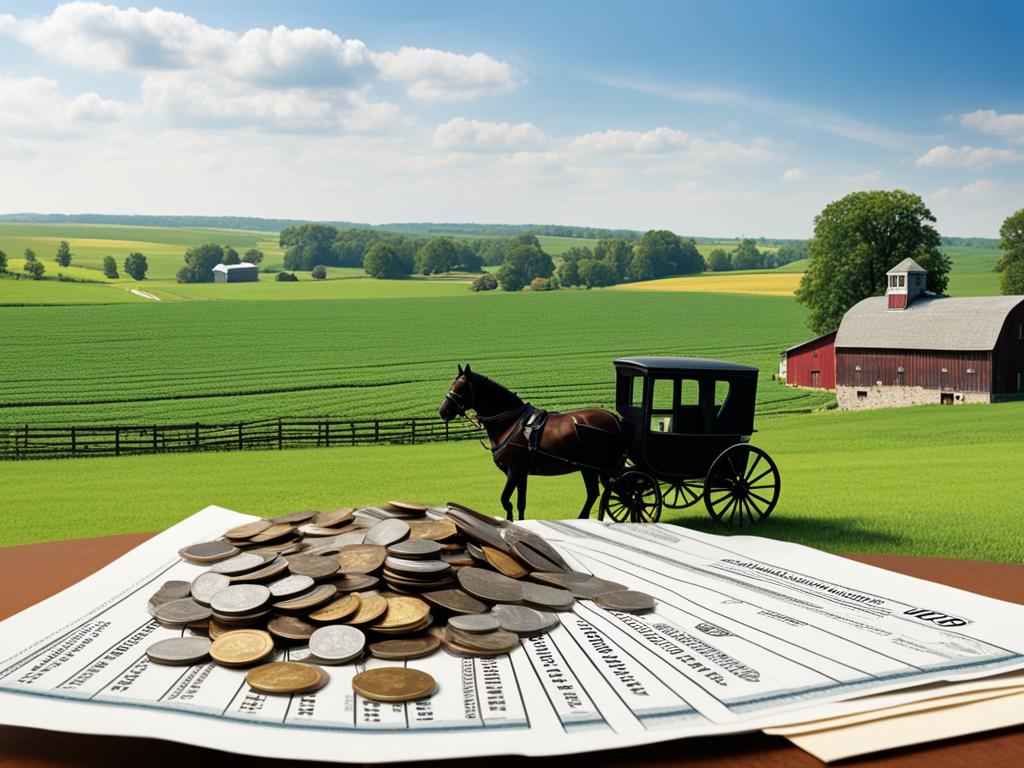Do Amish Pay Taxes? Uncover The Truth.
Many people often wonder, do Amish pay taxes? The answer might surprise you. Despite their private and isolated community lifestyle, the Amish are law-abiding citizens who fulfill their tax obligations just like any other American. They pay various taxes, including income, property, and sales tax. To gain a better understanding of Amish tax laws and their relationship with taxation, it’s essential to delve deeper into the realities of amish and taxation practices and debunk commonly held misconceptions.
Key Takeaways
- The Amish pay a range of taxes, including income, property, and sales taxes.
- Amish tax obligations are often misunderstood due to their private and isolated lifestyle.
- Understanding Amish taxes reveals that they are law-abiding citizens who contribute to public funds.
- Compliance with tax laws varies among Amish communities and depends on state regulations.
- Some Amish tax exemptions exist, such as Social Security and worker’s compensation taxes.
Misconceptions Around Amish Tax Obligations
The secretive nature of Amish communities has led to a widespread misconception that they are granted extensive amish tax exemptions and do not contribute to the nation’s tax revenue. However, this belief is far from accurate. Members of the Amish community, including the old order Amish, fulfill their tax obligations like any other law-abiding citizen. While their close-knit communities may appear isolated from the external world, they still comply with tax laws and maintain a strong sense of civic duty.
Contrary to popular assumptions, the Amish community does not enjoy broad tax exemptions. They dutifully pay taxes, though they often keep their transactions private. The notion that their separation from modern technology and government institutions grants them special tax privileges is unfounded. In fact, some Amish communities find the assumption of non-payment insulting, as they believe in fulfilling their responsibilities towards society.
Even as they avoid certain symbols of nationalism such as saluting the flag, their engagement in tax payment is consistent and in recognition of their civic duty.
While certain Amish customs may seem to suggest that they are exempt from tax payments, the truth is that their amish tax status varies depending on the specific tax category. Some might assume that their religious practices and lifestyle choices offer blanket tax deductions, but this is not the case. The Amish, like any other citizen, pay a range of taxes such as income, property, sales, and public school taxes.
In conclusion, the popular notion that the Amish are exempt from taxes is a result of misinformation and false assumptions. As law-abiding citizens, they pay their taxes as required by law, taking their civic duty seriously. By debunking these misconceptions and understanding the realities of their tax obligations, we can better appreciate the role of the Amish community within the broader U.S. society.
Understanding the Scope of Amish Tax Payments
As law-abiding citizens, the Amish engage in various economic activities that are subject to federal and state income taxes. They contribute to the economy through numerous businesses and diligently pay the appropriate income, property, and sales taxes based on their earnings and transactions. Despite their self-sufficient lifestyle, the Amish’s tax contributions play an essential role in supporting public services.
Income Tax Contributions by the Amish
Amish individuals participate in income-generating activities such as manual labor, farming, and selling homemade products. Their income is susceptible to federal and state taxes, requiring diligent income tax payments. Due to their business operations, Amish income tax contributions play a critical role in supporting the economy and adhering to the tax requirements set forth by the IRS.
Property Taxes Within Amish Communities
Amish communities are known for their large land holdings, often used for farming and communal living. This makes Amish property tax payments significant and essential for supporting local public services such as schools and libraries. Despite the tax burden being heavy at times, these contributions ensure that their communities meet their legal Amish taxation obligations.
The Real Impact of Sales Taxes on the Amish
Although the Amish are subject to Amish sales tax like any other U.S. citizens, their self-sufficient lifestyle limits their exposure to such taxes. Goods traded within the Amish community, such as rustic bread boxes and woven baskets, do not typically incur sales tax. However, when products are sold outside their community or through online channels, the Amish diligently comply with the sales tax requirements.

Do Amish Pay Taxes: Examining The Reality
Contrary to popular belief, Amish and taxation are not mutually exclusive. While their secluded lifestyle and religious beliefs play a significant role in their community, the Amish acknowledge and fulfill their tax obligations, just like any other U.S. citizens. The nature and extent of their tax payments may be misinterpreted or unknown, often leading to misconceptions about their fiscal responsibility.
In order to gain a better understanding of Amish taxes, it is crucial to examine their major tax contributions. Below is a summary of the common taxes paid by the Amish:
- Income Tax
- Property Tax
- Sales Tax
Despite their commitment to self-sustenance and mutual aid, the Amish recognize the importance of adhering to U.S. tax laws and contributing to the greater society. Although they maintain a separate and distinct lifestyle, their tax compliance demonstrates that they assume a responsible role in the nation’s economy.
Amish Tax Exemptions: The Line Between Fact and Myth
While the Amish fulfill many of their tax obligations, certain exemptions exist due to their unique beliefs and lifestyle. In this section, we will examine the reasons behind these exemptions and attempt to clarify the line between fact and myth.

Social Security and the Amish
One notable exemption for the Amish concerns Social Security taxes. Stemming from their religious beliefs and tightly-knit community structure, the Amish provide for themselves in terms of healthcare and other essential needs, thus exempting them from social security tax. Although Amish individuals possess amish social security numbers, their self-reliant society avoids dependence on federal social programs.
Navigating Gas and ‘Sin’ Taxes
Gas taxes do not generally apply to the Amish, as they rarely use gas-powered machinery or vehicles, choosing to rely on horse-drawn buggies instead. Furthermore, the Amish community is also exempt from ‘sin’ taxes associated with products like alcohol and tobacco, which are strictly forbidden within their communities.
Worker’s Compensation and Other Exceptions
Some states offer the Amish exemptions from participating in worker’s compensation programs, honoring their communal ethos of mutual aid. In cases of injury or illness, the Amish community supports their own, thereby reducing reliance on state-level compensation programs. This exemption serves as another example of distinct treatment under amish tax laws and U.S. taxation laws in general.
In conclusion, the Amish community pays various taxes similar to other U.S. citizens but holds certain exemptions that reflect their unique lifestyle and beliefs. By understanding the nuances in their tax obligations and exemptions, we can better appreciate the complexities of amish taxation within the United States.
Conclusion
In seeking to understand Amish taxes, it is essential to recognize that their contributions to public funds reflect a commitment to fulfilling civic responsibilities, even within their unique lifestyle. By paying property and other taxes, the Amish support services benefiting the broader community, highlighting a dedication that often goes unnoticed.
Amish Contributions to Public Funds
Contrary to popular misconceptions, the Amish contribute substantially to public funds through various forms of taxation. Their religious beliefs and community-centric lifestyle do not negate their obligations to U.S. laws, particularly tax laws. Apart from paying property, income, and sales taxes, the Amish dedicate themselves to enhancing the local economy through businesses and trades.
The Complex Truth Beyond the Simple Question
Understanding the Amish tax status involves examining a nuanced interplay between compliance and exemption. The Amish pay taxes where required and enjoy exemptions in specific areas like Social Security and gas taxes in line with their faith and community values. Overall, their tax contributions demonstrate a balance between honoring their religious beliefs and fulfilling their civic responsibilities within U.S. law.
FAQ
Do the Amish pay taxes?
Yes, the Amish pay a range of taxes, including sales, income, property, and public school taxes. Their commitment to tax laws varies depending on the state and their community, with some hiring professional accountants, while others manage taxes independently.
What are some common misconceptions about Amish tax obligations?
One common misconception is that the Amish are exempt from taxes due to their private and isolated community lifestyle. Contrary to these assumptions, Amish communities are quite dutiful in paying taxes and comply with tax laws.
What types of taxes do the Amish pay?
The Amish pay income taxes based on their various economic activities such as manual labor, farming, and selling homemade products. They also pay property taxes for the land they use for farming and sales taxes for products sold outside their community or through online channels.
Are there any tax exemptions for the Amish?
The Amish are exempt from Social Security taxes due to their religious beliefs and communitarian lifestyle. Additionally, they are exempt from gas taxes and ‘sin’ taxes associated with products like alcohol and tobacco, which are strictly forbidden within their communities. In some states, they may be exempt from participating in worker’s compensation programs.
Do the Amish contribute to public funds?
Yes, by paying property and other taxes, the Amish contribute to public funds, which support services benefiting the broader community. Their fiscal contributions reflect their dedication to fulfilling civic responsibilities.
How do the Amish navigate their tax obligations and exemptions?
The Amish’s tax status embodies a nuanced dance of compliance and exemption, reflecting their religious beliefs and a communal way of life. They pay taxes where required and are exempt in specific areas, honoring both their faith and obligations under U.S. law.

